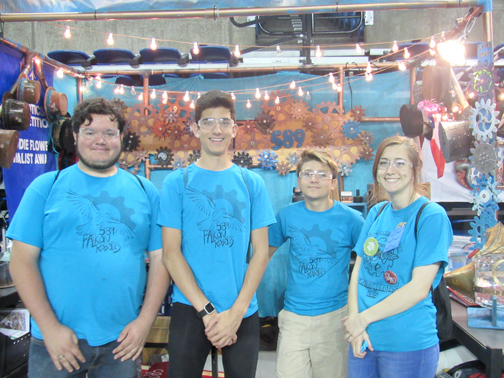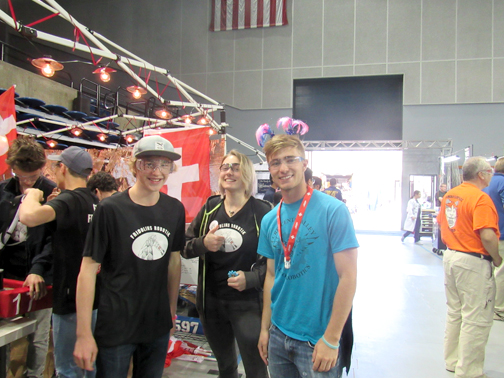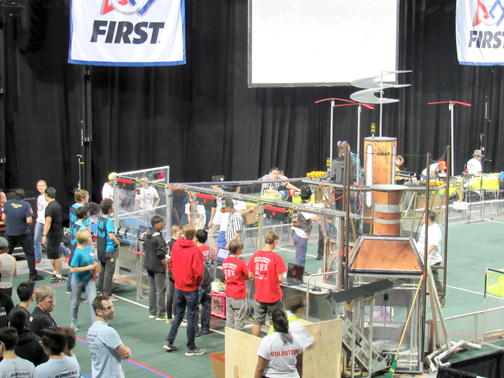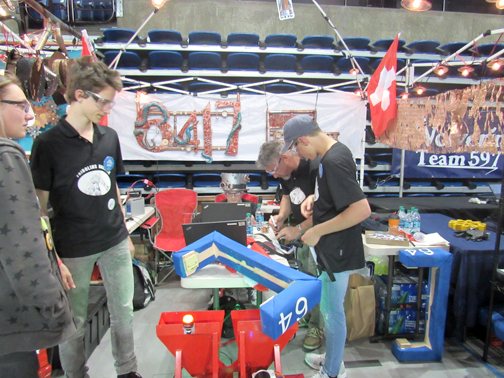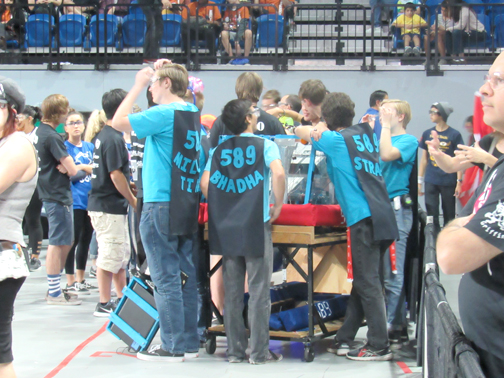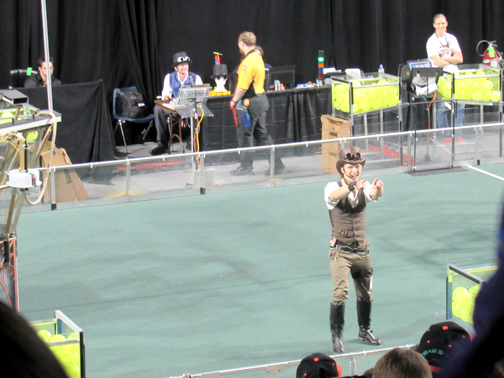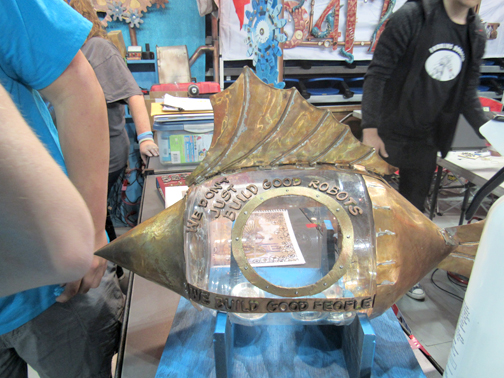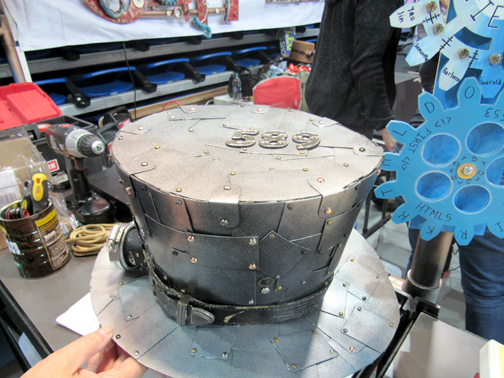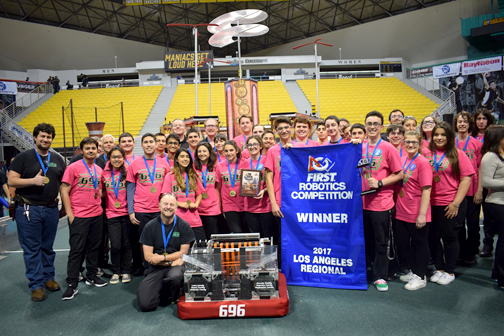
Clark Magnet High School robotics team placed No. 1 in the FIRST competition and is now preparing to head to Houston, Texas for the next round of competition along with the Crescenta Valley High School team.
Spirit of the games stretches across the globe.
By Mary O’KEEFE
You know that feeling when everything just seems to work? When all the gears are in sync and everything you planned and strategized actually comes to fruition? Well, that is the feeling Clark Magnet High School’s robotics team 696 is feeling right now as they prepare to move to the next step of the FIRST (For Inspiration and Recognition in Science and Technology) competition. They were ranked the number one team at the Los Angeles Regional Competition played in Long Beach and that means they will be competing in Houston, Texas next week in the FIRST World Championship Competition.
“It’s pretty exciting,” said Clark teacher/mentor David Black of the win. “This was the first win in the last decade, and only the second ever for the team.”
Each year FIRST creates a game with exact rules, not only in the playing of the game but also in the requirements of the player – a robot in this case. These requirements include specific weight, wheels and other materials specifications. In addition, these high school engineers, scientists and business people must build and learn the game in six weeks. Imagine playing a football game where the strategy and basic rules change annually. Now imagine having to build a robot that would compete in that game – not an easy task.
“After our qualification we were ranked number one. We were undefeated,” said Alexander Luke, president of Clark 696 and a senior this year.
Each game is played with a total of three randomly selected teams to form an alliance. For the final competitions, the top ranking teams were allowed to choose their alliance teams.
“We chose two partners to play in the play-off matches, in [those matches when] we went to the quarters, semis, then the finals. That is the best two out of three matches,” Luke said. “That was a little interesting because we lost the first match but then won the last two.”
The team did the same in the finals – lost the first match then won the next two – to keep the fans on the edge of their seats.
“We definitely gave the crowd a bit of a show,” Luke said.
Each team at the competition scouts other teams.
“It is similar to sports, where college scouts would come to look at athletes or colleges scout teams to [find players to] move on to professional teams,” he said. “We look at the quantitative data as far as the numbers: how many points are they scoring, what are they doing in every match and how can they be effective? So when you have to create your alliance and are looking at who do you pick, you are looking to see who brings the most as far as point benefits.”
In every aspect of this competition there is a constant stream of strategic planning, from the beginning to the actual competition.
“When we first analyzed the game on kick-off day (the day they receive the game instructions), on that first day we noticed right from the get-go that scoring those yellow gears and bringing them to the human players on the air ship would be a huge factor in this game,” Luke said.
This year’s game is steam punk themed, so there are lots of gears and goggles. Many teams have the robot grab gears and bringing them to a tower where humans take them and place them on a rail. This strategy, as well as being able to lift the robot off the ground, another way of scoring, worked for Team 696. Out of 60 teams it was ranked number one to win the regional competition – all of this while keeping up their schoolwork in their other classes. They competed against teams from Southern California as well as from Arizona and Hawaii and internationally against a team from Chile.
In addition, the team won the Quality Award sponsored by Motorola, which is the team’s fourth win of this award in the past six years. The Quality Award focuses on the robot, but also the team’s pit area presentation, apparel, operating procedures and overall program quality, Black stated.
Normally teams see a few problems during the competition, from electric issues to wheels – anything can go wrong – but Luke said this year was very calm for 696.
“We designed our robot to be quite robust,” he said. “A number of teams at different events all around the world were falling quite a bit during their climbs.”
Luke thought some of this was due to teams building the robot too light, a good thing to keep within the weight requirements but not too good for that final climb to get the robot off the floor.
“In LA we had never fallen during a climb,” he added. “We were able to keep that in mind during our design project.”
Now the team moves on to the FIRST World Championship Competition in Houston, Texas.
“[The win] is a result of a job well done. We had strong leadership this year. The students really took ownership of the project and helped each other,” Black said.
Clark will not be the only Crescenta Valley school in Houston. CVHS Falkons 589 Robotics’ Team will also be there.
The team competed in the Ventura Regional in Orange County and, although they did not win the finals match, they were honored with the Engineering Inspiration Award, which gives them a seat at the World Competition in Houston. They were also the recipients of the Imagery Award, which honors FIRST founder Dean Kamen.
“Having FRC 589 selected at the Orange County regional as the recipient of the Engineering Inspiration Award, celebrating outstanding, measureable success in advancing respect and appreciation for engineering, is a dream come true,” said 589 mentor Lyn Repath-Martos.
The team members inspire each other several ways including during weekly lunchtime seminars held at CVHS to broaden perspectives into careers in STEM (Science Technology Engineering and Mathematics). The team is involved in community outreach, service projects and mentoring local elementary and middle school students in LEGO robotics. This year 589 students logged accumulative 4,100 hours of community service and 40 students mentored 21 LEGO robotics teams. Their team has now grown to 122 students, Repath-Martos added.
“The mentors and students in FRC 589 have worked tirelessly to reach this point and were honored and humbled to be recognized with this award, one of three that automatically qualifies teams for world championships,” she said.
The team’s inspiration this year reached international status when a team from Switzerland competed at the Ventura Regional.
“[I’m a] little surprised at how well we are doing,” said Christian Hüerlimann, member of the Switzerland team.
The team, Fridolins, won enough matches at the competition to qualify to compete in Houston.
Hüerlimann was an exchange student at CVHS last year and stayed with former CVHS principal Linda and track and cross-country coach Mark Evans. His mother, Vreni, had been an exchange students years prior and had also stayed with the Evanses. During his time at CVHS, Hüerlimann was part of the robotics team, something he did not have at his school at the time. He liked robotics and when he went back home decided to create a team at his school.
“I told my parents that I didn’t want to miss this [opportunity],” he said.
But to put together a new team, get sponsors and build a robot in about three months seemed almost impossible.
“We thought we really want to do this, this year,” Hüerlimann said.
This is the first year of competing and the team ranked well enough to also go to the world championships in Houston.
“First we spoke to a teacher,” said Vreni. They needed at least one teacher to get on board for the team to start.
“I made a project description and gave it to [two teachers] and the principal and [said], ‘Yeah we can do this,’” Hüerlimann said.
They were able to get two business sponsors, one that makes wheelchairs and one that builds robots. They also got kids to join the team and then held their first meeting.
“At our first meeting [the kids] said, ‘No you can’t do this in six weeks!’ but somehow we did it,” he said.
Hüerlimann was not thinking of the big picture at the time; he just wanted to get a robotics team approved and ready for competition. But what he accomplished was to create the first high school robotics team in Switzerland – that’s inspiring.
But the project did not end with the building of the robot and development of the team; the team members had to get to California. So with more fundraising and outreach they were able to get to the Ventura FIRST competition.
“Without CV we couldn’t have done it. Without the help of Ms. Martos and [the Evanses] we could not have done this,” Vreni said.
Repath-Martos, the mentors and families of 589 and others opened their homes to the Switzerland team.
Hüerlimann said he hopes that his new team will inspire other kids in Switzerland to form their own FIRST robotics team.
The trip by the robotics teams to Houston and continuing to compete require a lot of fundraising. Both Clark and CVHS are raising funds. Anyone who would like to donate or would like more information can go to the Clark’s website at team696.org. For CVHS, visit cvrobots.com. The Houston World Championship Competition will be held on April 19-22.

